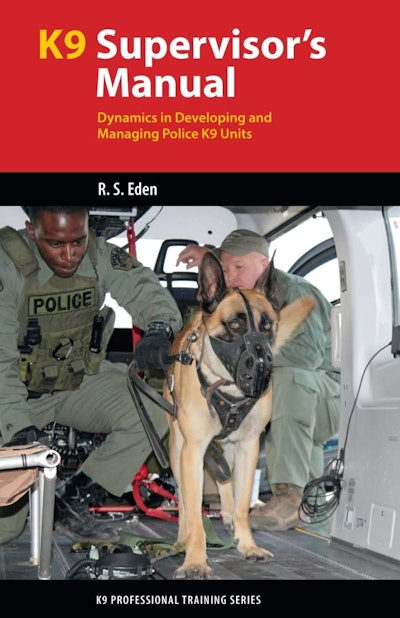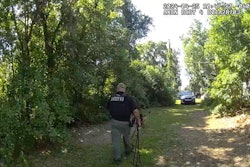 Discover more about matching police dogs and their handlers in the "K9 Supervisors Manual."IMAGE: Bob Eden
Discover more about matching police dogs and their handlers in the "K9 Supervisors Manual."IMAGE: Bob Eden
Not necessarily, warns Robert Eden, owner of Eden K9 Consulting & Training Corp and author of the K9 Supervisors Manual—Dynamics in Developing and Managing Police K9 Units.
Eden suggests a crucial initial step is finding a handler with an excellent track record and work ethic, who is also highly skilled at working with animals. Likewise, choosing a police dog that meets tough standards coupled with an excellent training program is a smart move.
However, he warns following all these steps does not guarantee team success.
"I've seen teams that checked all the boxes, but couldn't make it through training," he says. “I've seen teams finish training but struggle with training issues and challenges on the street. Sometimes the dog just stops working and has to be removed from the unit because the team is no longer productive.”
Every now and then, a handler and dog will clash, with the dog challenging or even attacking the handler. “While extremely rare, it’s not unheard of for a dog to turn on its handler with such severity that the handler subsequently shoots and kills the dog in order to protect themselves,” he writes in the “K9 Supervisors Manual,” Chapter 7.
If the department did everything right, why did this happen? Eden states the issue often stems from insufficient or incorrect training.
“If you believe you have the right handler and good quality dogs, and you still have problems, then consider auditing your current training program and even the trainer,” he says.
He believes conflicts within the team are often exacerbated by old-school trainers who advocate for handler dominance. Trainers who promote forceful techniques, he says, are ignoring the science of animal behavior.
Poor team matches—where the personalities of the dog and handler do not mesh—are another reason teams fail, he adds.
“Certain personality types do not play well together,” Eden explains. “When team members have mismatched personality types, it can lead to conflict and failure, after departments have invested much time and money in training.”
Understanding Dog Behavior
“A lot of canine communication comprises barks, whines and growls, so it’s important to know what dog sounds mean,” according to the American Kennel Club (AKC) website. “More often, however, dogs rely on nonverbal body language. That can lead to plenty of human-dog misunderstandings.”
Eden agrees, pointing out dogs are visual animals when it comes to communication.
“Dogs speak to us through body language. That is natural for them,” he says. “As trainers and dog handlers for police departments, our goal is to harness their natural abilities for our use.”
Female officers who work with dogs are often skilled at interpreting the dog’s body language, Eden adds. “They are not afraid to get down and have fun with the dog,” he says. “They are uninhibited in that aspect, but so are a lot of men.”
Understanding Human Personalities
“Good trainers instinctively know which dog will fit someone, but they have no way to explain why,” he says. “I’ve come up with a way of explaining it.”
Eden’s explanation begins with an understanding of a personality model developed by Virginia Satir, a psychotherapist recognized for her novel approach to family therapy. Satir invented a way to assess people's personalities to help them improve their relationships.
Satir’s model comprises five personality or communication types:
1. The Blamer: This person finds fault in everyone else but themselves. In a domestic dispute, this person would be the abuser. As handers, they will be harsh and accusatory, according to Eden.
“I see Blamers a lot in handlers,” he says. “They will say, ‘Stupid dog.’ But it’s not the stupid dog, it’s the stupid handler, who has created a situation where the dog is not performing the way it should and they don’t know how to fix the problem.”
2. The Placator: This person avoids confrontation by agreeing on almost every issue. Regardless of fault, they are always the first to shoulder the blame in a conflict or disagreement.
“As police officers, we often see this personality in domestic disputes,” Eden says. “This person is usually the victim and will do whatever it takes to avoid being abused again.”
3. The Computer: “Computer personalities are logical and clinical,” he says. “They make excellent administrators because they can make tough decisions with logic. They don’t let their feelings impede a straight up decision.”
They are calm, cool and collected all the time. “We see them a lot in police management positions,” Eden says.
4. The Distracter: These individuals are all over the place. “If you bring them into the office to talk to them about something they did wrong, they will sway the conversation to golf or anything else they can to get away from the situation that must be dealt with,” he says. “When they talk, they are hard to follow, which can make it difficult to communicate with them in a way that’s understandable.”
5. The Leveler: Eden describes this person as someone who is level and honest about issues and whose body language matches what’s being said. “Their voice tones and facial expressions are all natural,” he says. “Their self-esteem isn’t threatened if they run into a problem. They don’t take it personally. They take responsibility and do what it takes to fix things.”
Eden says understanding Satir’s personality types can help trainers team up dogs and handlers. “The next step is to consider the dog,” he adds.
Dog Personalities
Dogs also have personalities and inherent traits that must be considered, according to TopDogTips.com.
A confident dog, like an Alpha Dog, exhibits dominant behaviors to establish leadership and maintain alpha status within a pack. These dogs do not do well with harsh training methods but will thrive with positive reinforcement.
The Independent Dog may find it challenging to form a bond with individuals they do not perceive as leaders since they prioritize independence in their thoughts, actions, and lifestyle. The self-sufficiency of these dogs can make training a struggle as they may only perform if they believe it’s in their best interest to do so.
The Laid-Back Dog gets along with everyone, from other animals to people. They need plenty of training but will perform well with attention, play and food-based reinforcement.
When a Timid Dog encounters new situations, it will become nervous and afraid. These dogs are not suitable for police work without substantial exposure to new situations during training.
Personality Matches
In a perfect world, police departments would match a Leveler with all police dogs. These individuals will be productive, proactively handle training issues, and have a keen interest in learning. Balancing playfulness and assertiveness, they will handle their K-9 partner without excessive aggression and make smart decisions during deployments.
“All of these traits make them a good choice for the job,” Eden says. “However, you will be matching dogs to handlers with other personality types. That cannot be helped. But there are some dog-handler personality combinations to avoid.”
Often trainers match Blamer personalities with Alpha Dogs believing the handler is strong enough to handle the dog. “The result is often conflict, with the handler trying to control the dog, and the dog trying to control the handler,” he says.
The situation can lead to harsh corrections from the trainer. While a German Shepard might be forgiving enough to accept these corrections, Eden says a Belgian Malinois may not be. “There have been cases where these dogs have bitten their handlers,” Eden says. “You cannot treat a Belgian Malinois in the same way you treat a German Shepard.”
Eden recommends departments without alternatives select a German Shephard rather than a Belgian Malinois for Blamer handlers. He adds trainers must employ creative training techniques to help the Blamer understand harsh corrections and dominating the dog will create conflict. The best way to handle the dog is with patience and positive reinforcement, he maintains.
“If you can manage a Blamer, you may be able to bring out certain things in the dog, as long as you can control the Blamer from getting too out of control with the dog,” he says.
A common pairing Eden observes is a Blamer with a younger and more forgiving dog. He mentions this combination can also lead to issues. Here, the handler runs the risk of being too heavy handed. “The Blamer is going to destroy that dog,” he says. “The dog will wash out in training. We need to level up the dog’s personality in training to make the dog more confident, so he works to the best of his ability.”
Another troublesome pairing is a Placator with an Alpha Dog. “Who is going to rule the roost in this relationship?” Eden asks. “The dog! That dog will not work for a Placator. In the dog’s mind, the handler is low in the pack structure, and it will not respect the handler’s authority. Even if they manage to make it through training, this partnership will never be productive on the street.”
Matching a Placator with a weak dog is also a bad combination, he adds. The dog could end up being more of a family pet than a working dog, and the team probably won't be very productive on duty, he says.
A Computer paired with a young dog also will not work well, he adds. A Computer's logical personality won't mesh well with a young dog that needs clear verbal and physical communication, he explains.
The Computer’s limited praise and lack of emotional excitement will confuse the dog. Eden explains, “You want to get them riled up before you send them in on something. Computer personalities need to be paired with a dog that loves to work for themselves.”
To make a self-motivated dog and a Computer personality type work well together, it's important that the dog is motivated and can work independently.
A Distractor with any dog type is a problem, Eden concludes. He warns this personality can be detrimental and perplexing for dogs and is not a mix he would recommend.
“Distractors are all over the place, and a dog relies on consistency to work,” he says. “I would walk away from Distractor personalities.”
Takeaways
In police K-9 units, success depends on the handler, the dog, and how well they work together.
By recognizing the nuanced communication styles of both humans and canines, departments can refine their selection processes to prioritize compatibility and mitigate potential conflicts.

















